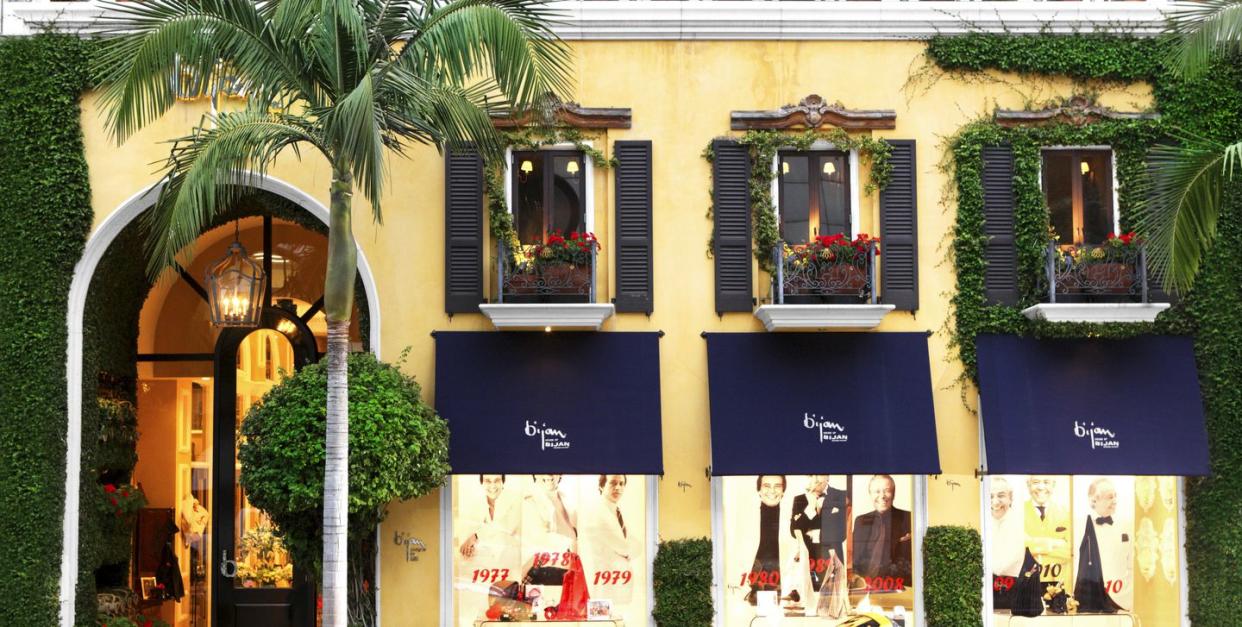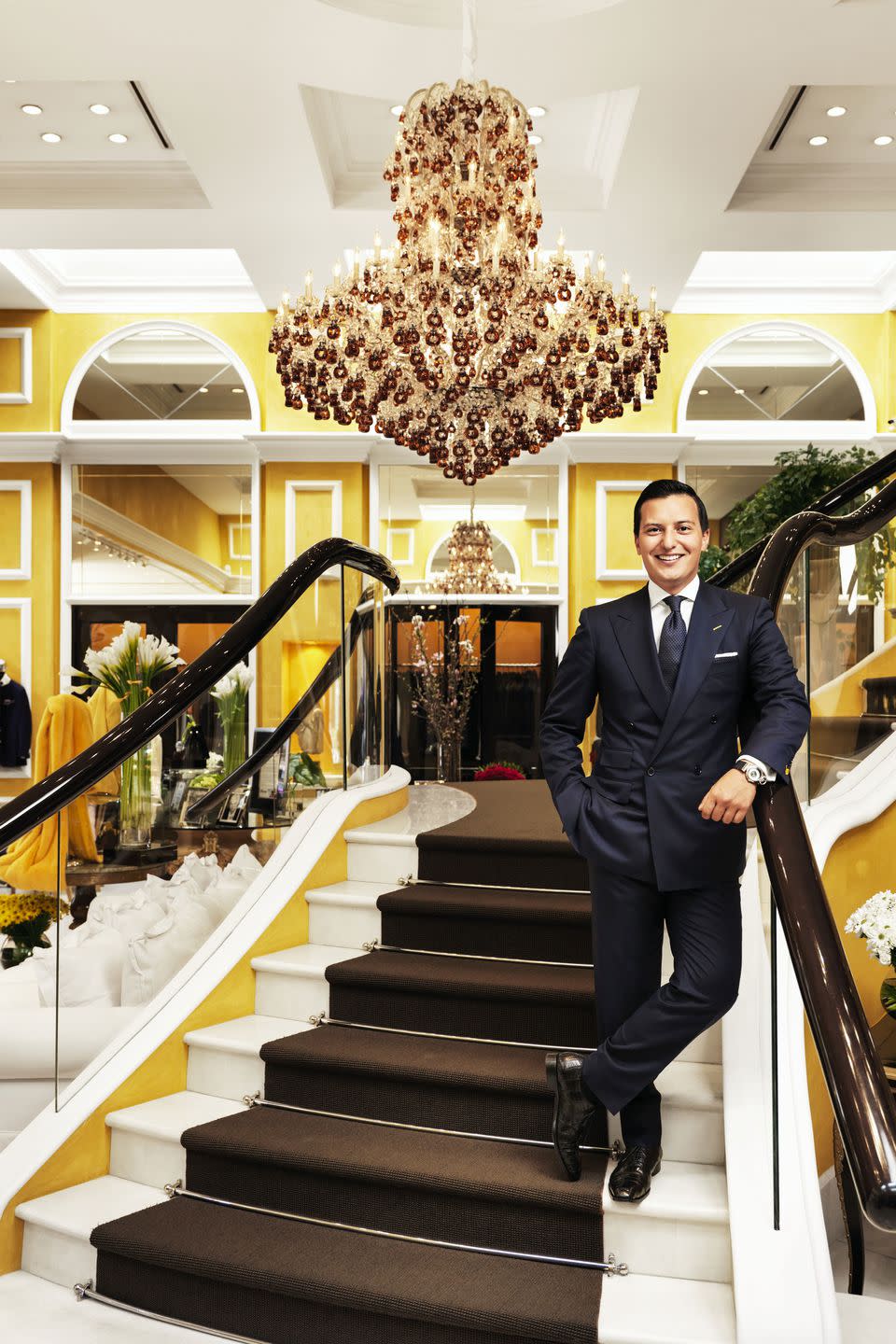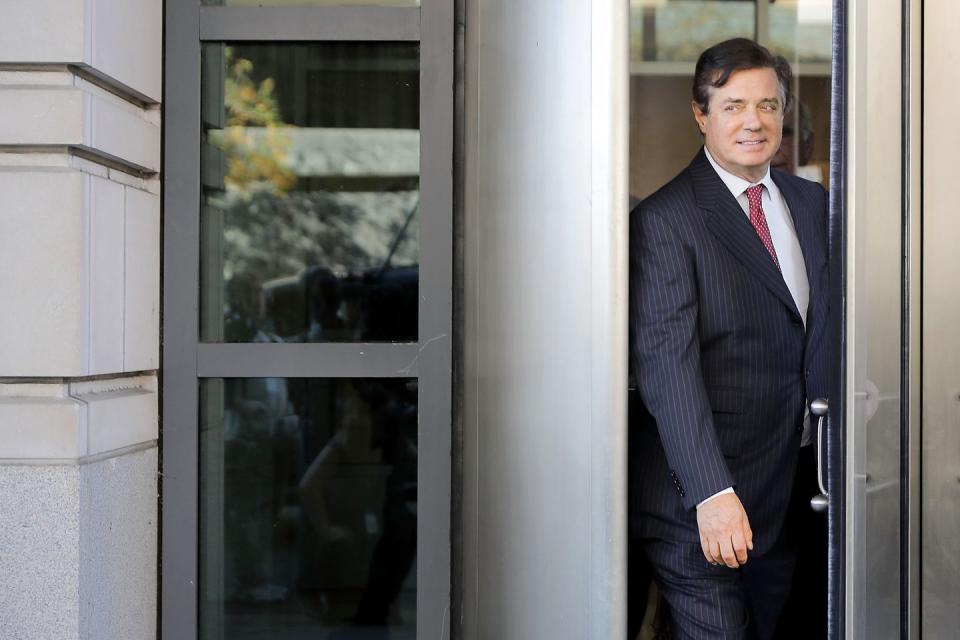In Beverly Hills and Beyond, Bijan Carries on a Tradition of Excess and Exclusivity

Nicolas Bijan, the proprietor of Bijan, the famed appointment-only boutique in Beverly Hills, is a smooth, voluble host. Like his late father, Bijan Pakzad, the Tehran-born designer who founded the store, he is a gifted salesman, fresh-faced and impeccably attired as he glides over the store’s white marble floors, suavely showing off decadent goods: $950 ties, $10,000 suits, and $175,000 purses studded with diamonds and trimmed with gold.
“We make only two of each tie. We like to consider it a piece of art,” he says with obvious satisfaction. “For some men that’s worth a lot.”

So it comes as a surprise when the 27-year-old, normally a cool customer used to accommodating any request, stiffens at the mention of one uncomfortable subject. The store his father opened in 1976 and turned into an international symbol of conspicuous consumption, a cozy clubhouse for a globetrotting clique of moguls, monarchs, and occasionally mobsters-some of whose names are discreetly stenciled along the bottom of the shop’s windows-was back in the news recently thanks to one of its notorious clients: Paul Manafort.
When President Donald Trump’s former campaign manager went on trial this summer for bank fraud and tax evasion, his huge clothing bills were cited by prosecutors as evidence of the lobbyist’s decadence and dishonesty. In just five years Manafort had spent $520,000 at Bijan, splurging on such items as a $48,000 blue lizard jacket and a $12,000 pink pinstripe suit, paid for with money wired from overseas accounts.
Bijan, anticipating the question, recovers expertly. He notes that the store doesn’t even make the notorious ostrich jackets Manafort owned. “We haven’t had ostrich in 20-some years,” he sniffs.

Bijan has never aspired to be the world’s hippest haberdashery or even the most stylish. Instead it bills itself as the most expensive and exclusive men’s store in the world. Passing through its heavy mahogany doors you feel as if you’re walking onto a sumptuous stage set, one outfitted with colorful Botero paintings and bright yellow walls. A Bugatti or Rolls is usually parked outside.
The elder Pakzad knew all his customers by name (they ranged from the shah of Iran to Frank Sinatra), he called them on birthdays and anniversaries, and he posed in hilariously over-the-top ads with Bo Derek and Michael Jordan. Eventually his store became synonymous with a kind of ostentatious Hollywood glamour-the L.A. of Alfred Bloomingdale and the Gabor sisters and the pool at the Beverly Hills Hotel.
When he died suddenly of a stroke in 2011, Nicolas was a 19-year-old sophomore studying business at Pepperdine University, and he had to quickly pivot to steering his father’s time-tested vision into a new era.
“My father was so involved in every aspect of the store that most people couldn’t imagine that it could continue without him,” Bijan tells me. “Everyone thought we were done.” Working closely with his father’s business partner, Dar Mahboubi, Bijan began a yearlong immersion in the family trade.
He tried to continue his studies at night, but he gave up just before he was set to graduate because of the demands of the job. What are you supposed to do when you need to study for a final but have to entertain the sultan of Brunei? “My father spent 40 years building this,” he says. “It’s still such a legacy to uphold.”

Seven years later the store is thriving. In 2016 alone, revenues were $30 million, twice what they were when Bijan’s father died, according to Forbes. “When I became the face of the store, we became a younger brand, and we attract a younger audience: actors, athletes, royals,” he says. “Our clientele used to be well over 50.”
And after closing its Fifth Avenue flagship in 2000-Trump was a customer there, as was Manafort-Bijan is once again expanding its brick-and-mortar presence, opening outposts in the Waldorf Astoria in Beverly Hills and the Wynn Las Vegas. New stores planned for London, the Middle East, and Asia could, he says, give the company a valuation of $1 billion.
Despite Bijan’s best efforts, however, the store can seem like an anachronism in a new, woke era. Some critics are aghast at his prices-customers spend, on average, $75,000 to $100,000 in a single visit-and his endless appetite for exotic animal skins. The clientele too sometimes brings unwanted attention. Bijan shot to the top of Google searches in Malaysia earlier this year when one of its bags was among more than 500 seized from the country’s former prime minister, Najib Razak, in an ongoing corruption scandal. Then, of course, there’s Manafort.
Bijan politely declines to discuss the matter, but he eventually relents. “What I can say is that this isn’t the first time we have encountered controversy with one of our clients, and it most certainly won’t be the last. It’s not our business to know what these men and women do,” he says. “We are not involved in politics. We’re in the politics of fashion.”
This story appears in the November 2018 issue of Town & Country. SUBSCRIBE NOW
('You Might Also Like',)


